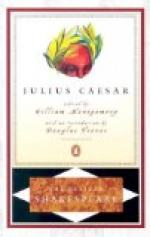|
This section contains 658 words (approx. 3 pages at 300 words per page) |

|
The Fallacy of Revolutionary Violence
Summary: Analyzes Peter J. Leithart's article "Caesar's Reviving Blood: Shakespeare and the Religion of Revolution" in comparison to William Shakespeare's "Julius Caesar."
Peter J. Leithart shows in his article titled "Caesar's Reviving Blood: Shakespeare and the Religion of Revolution" that William Shakespeare considered revolutionary violence a myth. Using four key points he illustrates how, through Julius Caesar, Shakespeare demonstrates his disbelief in the theory that once society is disrupted by controversy, it can only be brought back through acts of sacred violence. His first point focuses on how the conspirator's motivation for killing Caesar is not all political. Leithart explains that Brutus's nobility basically becomes his tragic flaw. Such as, Brutus does not kill Antony so the conspiracy is not too bloody. However, this ultimately leads to Antony gaining the citizens trust and support to force the conspirators to flee out of Rome and wage a civil war against them. He is blinded by his own nobility and eagerness to convince himself that he is doing it all for Rome...
|
This section contains 658 words (approx. 3 pages at 300 words per page) |

|


